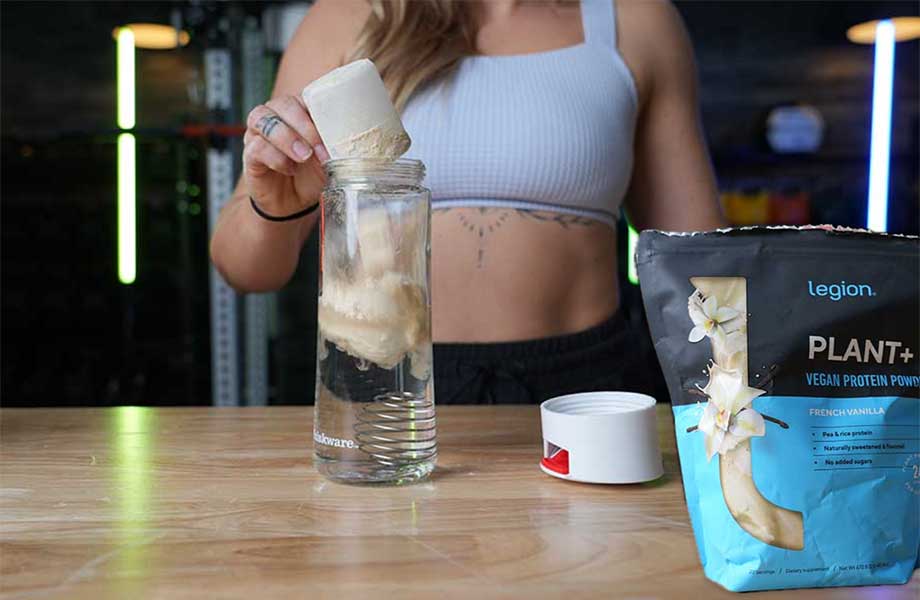Legion is no stranger to GGR’s lineup of the best protein powders, consistently earning positive reviews for its dairy-based products. But does their Plant+ protein grow to these high standards?
In our detailed Legion Plant Protein Review, we delve deep into its plant-based formula, expertly analyzed by a dietitian (raises hand). Plus, GGR Everything lead reviewer Lindsay Sheele, CPT, offers her firsthand insights using Legion Plant+, covering everything from flavor to side effects. Let’s dig into it!
Medical disclaimer: This article is intended for educational and informational purposes only. It is not intended as a substitute for medical advice. For health advice, contact a licensed healthcare provider. GGR also recommends choosing a product that has been third-party tested for quality.
100+ Protein Powders Rigorously Tested By Fitness and Nutrition Experts
Our dedicated testing team at GGR—stacked with certified personal trainers, nutritionists, dietitians, CrossFit Level 1 trainers, and USA Weightlifting coaches—has rigorously tested over 100 protein powders. But our focus extends beyond just sampling the latest and greatest flavors.
At GGR, we prioritize providing honest insights because you deserve to know exactly what you’re investing in, especially regarding your health. Sharing our extensive hands-on experience and deep knowledge aims to guide and inform your decisions, including if Legion Plant+ best suits your health journey.
We test products according to our extensive GGR supplement testing methodology, using a scale of 1 to 5 to rate each product on a variety of factors, including:
- Flavor
- Formulation
- Solubility
- Customer reviews
- Price per serving
- Customer service
Legion Plant+
Legion Plant+ Non-GMO Plant-Based Protein Powder
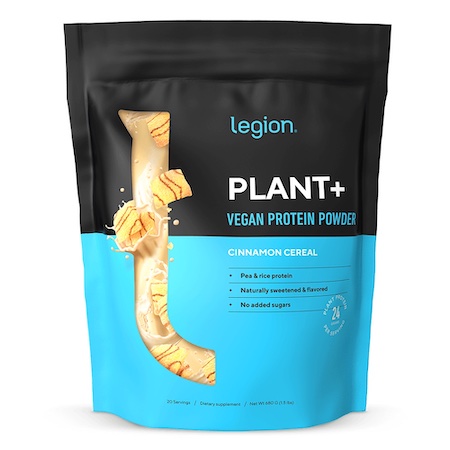
Product Highlights
- Brown rice and pea protein
- 24 g of protein per serving
- 6 flavors available
- No added sugar
- NSF-certified
Pros & Cons
Pros
- 24-25 g of protein per serving
- Provides a complete amino acid profile
- No artificial ingredients
- 6 flavors available
- Reviewers say the texture is great for a vegan protein
- Third-party tested
- Subscribe and save
Cons
- $2.50 per serving is on the high end for protein powder
Bottom Line
Legion's Plant+ plant protein is made of a blend of pea and brown rice and contains 24-25 grams of protein per serving. Reviewers like the texture and taste, which for a vegan protein powder is much harder to come by.
A Quick Look at Legion Plant+
Legion Athletics has become a top pick at GGR, from pre-workouts to protein supplements. Lindsay was so impressed with Legion’s grass-fed whey isolate protein powder that she dedicated an entire video to it (without being approached by Legion).
RELATED: Legion Whey Protein Review
So, to clarify, our enthusiasm for Legion isn’t driven by financial incentives but rather a genuine belief in their science-backed, third-party-tested products, including Plant+. We also still acknowledge a few aspects to consider before purchasing.
Before You Buy
- New to plant proteins? Prepare for a noticeable shift in flavor and texture.
- Important allergen info: Plant+ contains tree nuts and may be cross-contaminated with milk, eggs, fish, shellfish, peanuts, wheat, and soybeans. While the Amazon product page states it’s gluten-free, this detail is unspecified on the Legion website.
- Savings tips: Bulk purchases and subscribe and save options are available, potentially saving you up to 30%. Legion also regularly updates sales on their site and GGR has a Legion Athletics coupon code.
- Unmatched return policy: Legion offers a full refund on your first order if you’re unsatisfied (without returning the protein)!
Is Legion Plant+ Worth It?
At $2.50 per serving, Legion’s Plant+ is at the pricier end of other plant-based protein powders. However, its high ratings in key areas suggest it may be a valuable investment.
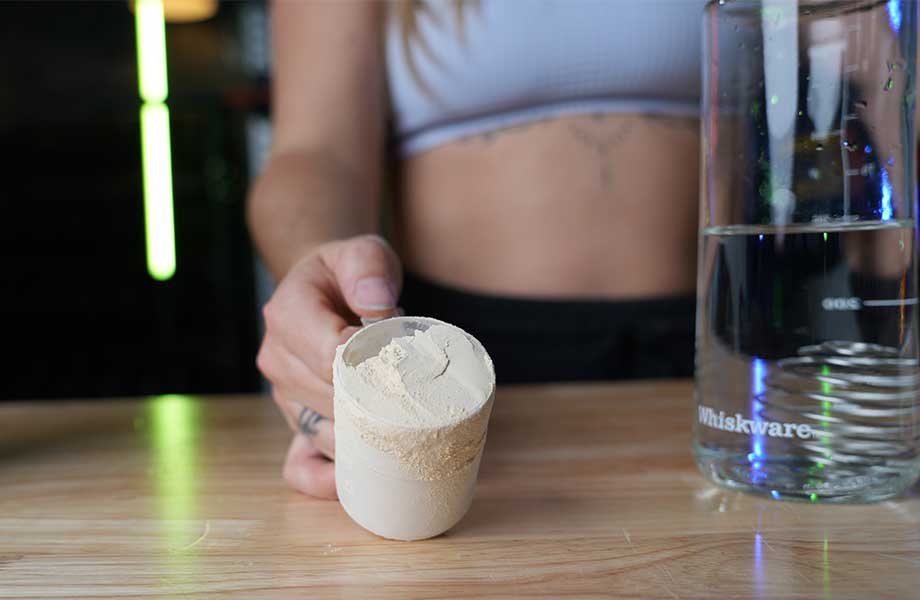
RELATED: Plant-Based Protein Powder Benefits
Great for:
- Individuals who prefer a natural formula
- Vegetarians, vegans, and those with lactose intolerance or dairy allergies
- Consumers who value third-party testing
Not recommended for:
- Those who favor dairy-based protein powders
- Individuals with allergies worried about potential cross-contamination
- Budget-conscious consumers
Legion Plant+ Specs
| Price per serving | $2.50 |
| Serving Size | 33.64-36.5 g (depending on flavor) |
| Type of protein | Pea Protein, Brown Rice Protein Concentrate |
| Protein content | 24-25 g (depending on flavor) |
| Carb content | 3-5 g (depending on flavor) |
| Fat content | 3-4 g (depending on flavor) |
| Notable ingredients | Organic Pea Creamer, Natural Flavors and Sweeteners, Salt |
| Flavors | Apple Pie, Cinnamon Cereal, Dutch Chocolate, French Vanilla, Mocha Cappuccino, Salted Caramel |
| Third-party tested? | Yes |
Experience Using Legion Plant+
GGR Everything Lead Reviewer Lindsay Sheele tried the Apple Pie flavor. While she thought the apple flavor was a bit lackluster, and certainly not her beloved Whey+ Cinnamon Cereal, its addition of cinnamon and its overall solubility were noteworthy—see “Taste and Solubility” below for these details.
Price Per Serving
A 20-serving container of Plant+ costs $49.99, equating to $2.50 per serving before taxes. The cost is comparable on third-party seller sites, including Amazon and Walmart.
The average cost per serving of the best vegan protein powders we’ve tested is about $1.92, ranging from $0.81 to $3.00 per serving. With Plant+ costing on the higher end at $2.50 per serving, we rate it a 1 out of 5 in this category.
However, Legion also offers a rewards program for future savings and various multi-pack and subscription options at discounted rates. A recurring order of a five-pack is the most economical option, bringing the cost down to $2.00 per serving.
Formulation
The Plant+ formulation earns its 5-star rating, providing 24 to 25 grams of protein per scoop. Let’s dig into the details of this plant-based protein.
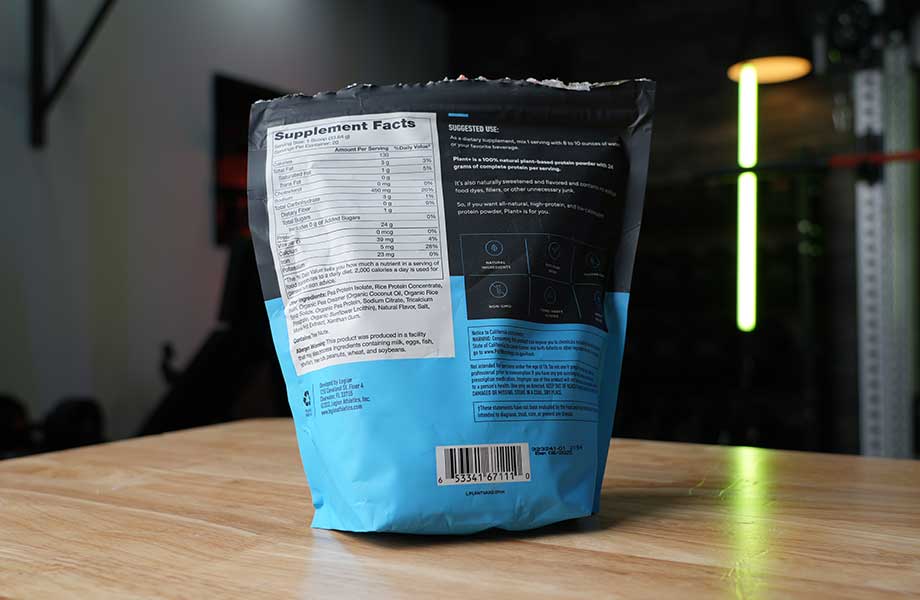
Pea and Brown Rice Protein Blend
Most plants are incomplete proteins, except for a select few like pea protein, meaning they lack at least one essential amino acid (EAA). The body needs EAAs, including the branched-chain amino acids (BCAAs), to leverage vital functions and benefits of protein—like supporting bodybuilding and weight loss goals.
Plant+ strategically combines pea protein and brown rice protein for one core reason: to provide a complete protein. “But Sydney, you just said pea protein is a complete protein…” You’re right, but please hear me out!
While pea protein is technically complete, research1 shows it’s low in the EAA methionine. Brown rice is high in methionine, so blending the two provides a more comprehensive acid profile. Brown rice and pea protein powders also provide leucine, the BCAA known for its muscle-building properties, similar to casein protein.
Other Ingredients
Although ingredients slightly vary based on flavor, Plant+ also contains:
- Organic pea creamer: The creamer is a mix of organic ingredients like coconut oil, rice syrup solids, pea protein, and sunflower lecithin enhances stability, texture, and shelf life.
- Natural flavors: Despite the term “natural flavors” broadly encompassing various plant and animal derivatives, we assume these are from plants.
- Salt helps extract the pea protein2 while enhancing the flavor of the protein powder.
- Natural sweeteners, like stevia leaf extract and monk fruit, add sweetness.
- Gums, including xanthan and guar gums, offer a creamier texture.
Taste and Solubility
Lindsay tried the Apple Pie flavor and rated its taste a 4 out of 5. Even though Plant+ is formulated with natural sweeteners and flavors, Lindsay said it has a “very sweet and artificial flavor. The apple flavor was a bit lacking, but the cinnamon taste saved it. Not bad, but will probably be too sweet for some.”
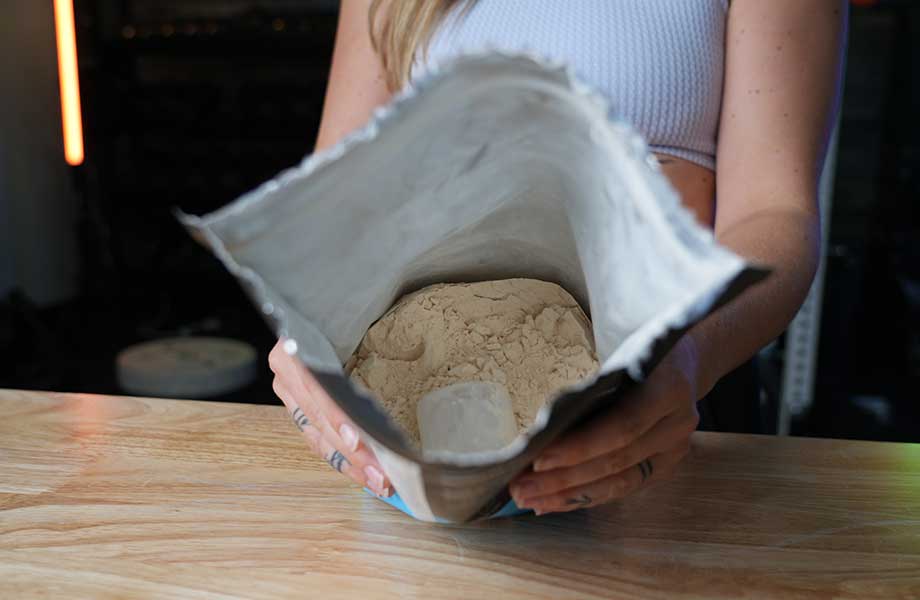
Although the texture of plant protein powders isn’t as smooth or creamy as casein or whey protein powder, Lindsay rates Legion Plant+ a 5 out of 5 for its solubility. “I mixed it with oat milk and it had a good texture, not too thick either,” she said.
Side Effects
Aside from our testers noting Legion Plant+ wasn’t very filling, no side effects were noted. However, while convenient and quick, protein shakes aren’t always the most satiating (filling) and shouldn’t be used as meal replacement shakes in most cases.
Third-Party Testing
Though Legion is certified by Labdoor, an independent supplement certification company, Plant+ has yet to be tested by them. But fret not! It’s third-party tested by an ISO 17025-accredited lab, with its certificate of analysis available online, and produced in NSF-certified, FDA-inspected, and cGMP-compliant facilities in the U.S.
Legion Plant+ vs KOS Organic Plant Protein
KOS Organic Plant Protein
KOS Vegan Protein Powder
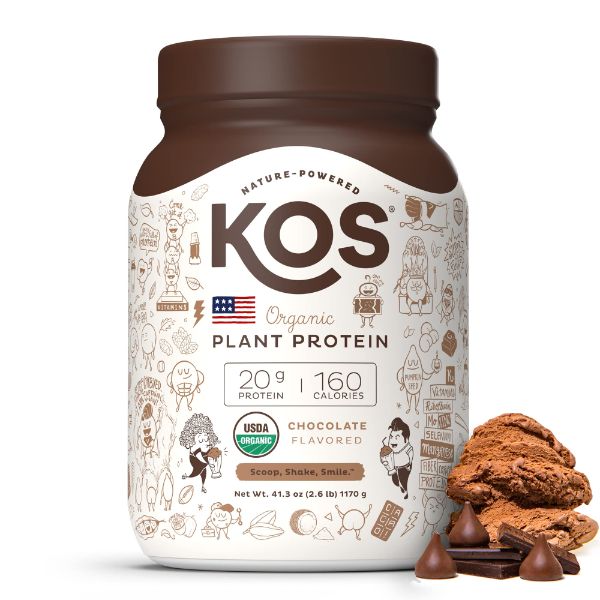
Product Highlights
- Multi-source vegan protein powder
- USDA-certified organic, soy-free, gluten-free, dairy-free, non-GMO
- Digestive support via DigeSEB to help maximize absorption
Pros & Cons
Pros
- Manufactured in the USA
- Superfood-infused
- 20 g protein per serving
- Chocolate flavor is rich
- Enhanced with digestive support enzymes
- Under $1.50 per serving
Cons
- Customers say it has a gritty/chalky flavor
- Some users reported protein gave them stomach issues
- Reports of strong sweetness and bad aftertaste
Bottom Line
KOS is a vegan protein with a lot of positive reviews, but a number of people experienced stomach issues using this protein powder.
KOS Organic Plant Protein, a non-GMO and certified organic protein powder, offers unique features compared to Plant+. Although both are vegan-friendly, here’s how KOS stands out:
- Lower protein per serving: Provides 20 grams per serving, meeting the minimum standard of what we look for in protein powders, compared to Plant+’s 25 grams.
- Multi-protein blend: Includes pea, chia seed, flax seed, pumpkin seed, and quinoa proteins.
- Added nutrition: Offers a variety of digestive enzymes, superfoods, vitamins, and minerals.
- Affordability: Costs about $1.00 less per serving than Legion Plant+.
- Meal replacement suitability: With higher amounts of carbohydrates, fats, and dietary fiber, KOS is more suitable for those seeking a meal replacement protein powder.
- Unflavored option: If you prefer adding protein to drinks or foods without changing the taste.
Check out the comparison table below and our KOS Vegan Protein Powder Review for extra details.
| Legion Plant+ | KOS Organic Plant Protein | |
| Price per serving | $2.50 | $1.50 |
| Serving Size | 36.5 g (Dutch Chocolate) | 39 g (Chocolate) |
| Type of protein | Pea and Rice Proteins | Organic Pea, Chia Seed, Flax Seed, Pumpkin Seed, and Quinoa Proteins |
| Protein content | 25 g | 20 g |
| Carb content | 3-5 g (depending on flavor) | 8-9 g |
| Fat content | 3-4 g | 5-6 g |
| Notable ingredients | Organic Pea Creamer, Natural Flavors and Sweeteners, Salt | Organic Fruit and Veggie Blend, Organic Enzyme Blend, KOS Vitamins and Minerals Blend, Natural Sweeteners and Flavors, Himalayan Salt |
| Flavors | Apple Pie, Cinnamon Cereal, Dutch Chocolate, French Vanilla, Mocha Cappuccino, Salted Caramel | Blueberry Muffin, Chocolate, Chocolate Chip Mint, Chocolate Peanut Butter, Salted Caramel Coffee, Unflavored, Vanilla |
| Third-party tested? | Yes | Yes |
Customer Experience
Legion provides a robust FAQ section and highly accessible customer support. You can easily reach out via phone, text, email, or live chat on their website.
For the cherry on top, Legion offers a 100% money-back guarantee if you’re not completely satisfied. Simply inform Legion and receive an immediate full refund—no forms or return processes are required!
Ordering Legion Plant+
Simply add the item(s) to your cart and fill in your shipping and payment information. While a Legion account isn’t necessary to purchase, creating one grants you access to a rewards program for future discounts.

Legion provides free shipping on all orders in the United States. For international customers, orders over $99 ship free to the UK and Canada, and orders above $199 qualify for free shipping to other locations.
You can save 10 percent on recurring orders scheduled every 30, 60, or 90 days. For more committal and large orders, set recurring orders for three, four, or five packs and increase your savings to 20 to 30 percent.
Customer Reviews
At the time of writing, Plant+ has a 4.42 out of 5 rating with over 1,200 verified reviews on the Legion website and 3.9 with 400 ratings on Amazon. Most agree it’s a satisfying alternative to animal proteins without causing side effects, though others mention a chalky texture (albeit expected from plant proteins). And can we please recognize Legion’s outstanding customer service, even to a third-party Amazon customer!?
Final Verdict of Our Legion Plant+ Review
Plant+ is a low-carb, low-fat, high-protein plant powder in many flavors. While it’s not the cheapest option, if your budget can accommodate it, consider these final thoughts on why you might want to add Plant+ to your supplement stack:
- Provides 24 to 25 grams of protein per scoop with a complete amino acid profile.
- Undergoes third-party testing for purity and potency.
- Offers a 100% money-back guarantee and excellent customer service.
Full Rating
Legion Plant+ Protein

Legion’s Plant+ plant protein is made of a blend of pea and brown rice and contains 24 grams of protein per serving.
Product Brand: Legion
Product Currency: $
Product Price: 49.99
Product In-Stock: InStock
4.24
Legion Plant+: FAQs
Is Legion protein powder clean?
Legion Whey+ protein powder is one of the best clean protein powders due to its minimal and natural ingredients list. We also consider Legion’s other protein powders, like Plant+ and Casein+, clean because of their high-quality formulations without added sugars, artificial sweeteners, and preservatives.
What are the downsides of plant protein powder?
Plant-based protein powder benefits mostly outweigh the risks, especially when avoiding known allergens, selecting third-party tested products, and complementing a balanced diet. However, we recommend reviewing the amino acid profile or consulting a nutrition expert, as some powders may lack some essential amino acids necessary to build muscle, enhance recovery, and support overall health.
Can you eat plant protein everyday?
Although consuming plant protein daily is generally safe, vary plant protein sources to ensure the intake of all essential amino acids and other nutrients the body needs to function optimally. For personalized dietary advice, consult a nutrition expert.
Is plant protein inflammatory?
If managing a soy or plant protein allergy, Celiac disease, or similar condition, consuming the food trigger may cause inflammation. However, without dietary restrictions, recent studies involving aging individuals3 and adults with chronic kidney disease4 suggest that plant proteins may reduce inflammation. A 2020 meta-analysis5 supports that plant-based diets lead to lower levels of C-reactive protein (CRP), an inflammation marker, compared to omnivorous diets.
These statements have not been evaluated by the Food and Drug Administration. This product is not intended to diagnose, treat, cure, or prevent any diseases.
References
- Gorissen SHM, Crombag JJR, Senden JMG, et al. Protein content and amino acid composition of commercially available plant-based protein isolates. Amino Acids. 2018;50(12):1685-1695. doi:10.1007/s00726-018-2640-5
- Sun XD, Arntfield SD. Gelation properties of salt-extracted pea protein induced by heat treatment. Food Res Int. 2010;43(2):509-515. doi:https://doi.org/10.1016/j.foodres.2009.09.039
- Hruby A, Jacques PF. Dietary Protein and Changes in Biomarkers of Inflammation and Oxidative Stress in the Framingham Heart Study Offspring Cohort. Curr Dev Nutr. 2019;3(5):nzz019. Published 2019 Mar 28. doi:10.1093/cdn/nzz019
- Aycart DF, Acevedo S, Eguiguren-Jimenez L, et al. Influence of Plant and Animal Proteins on Inflammation Markers among Adults with Chronic Kidney Disease: A Systematic Review and Meta-Analysis. Nutrients. 2021;13(5):1660. Published 2021 May 14. doi:10.3390/nu13051660
- Menzel J, Jabakhanji A, Biemann R, et al. Systematic review and meta-analysis of the associations of vegan and vegetarian diets with inflammatory biomarkers. Sci Rep. 2020;10(1):21736. Published 2020 Dec 10. doi:10.1038/s41598-020-78426-8


